The Party’s Over
- Talk Talk
- It’s So Serious
- Today
- The Party’s Over
- Hate
- Have You Heard The News?
- Mirror Man
- Another World
- Candy


Sounds: early 1982
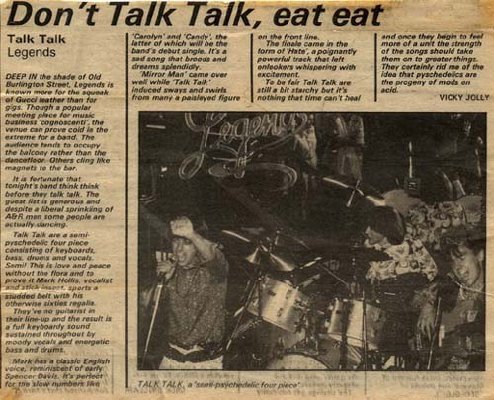
Deep in the shade of Old Burlington Street, Legends is known more for the squeak of Gucci leather than for gigs. Thought a popular meeting place for music business cognoscenti, the venue can prove cold in the extreme for a band. The audience tends to occupy the balcony rather than the dancefloor. Others cling like magnets to the bar.
It is fortunate that tonight’s band think think before they talk talk. The guest list is generous and despite a liberal sprinkling of A&R men, some people are actually dancing.
Talk Talk are a semi-psychedelic four piece consisting of keyboards, bass, drums and vocals. Semi! This is love and peace without the flora and to prove it Mark Hollis, vocalist and stick insect, sports a studded belt with his otherwise sixties regalia. They’ve no guitarist in their line up and the result is a full keyboardy sound sustained throughout by moody vocals and energetic bass and drums.
Mark has a classic English voice, reminiscent of early Spencer Davis. It’s perfect for the slow numbers like ‘Carolyn’ and ‘Candy’ the latter of which will be the band’s debut single. It’s a sad song that broods and dreams splendidly.
‘Mirror Man’ came over well, while ‘Talk Talk’ induced sways and swirls from many a paisleyed figure on the front line.
The finale came in the form of ‘Hate’, a poignantly powerful track that left onlookers whispering with excitement.
To be fair, Talk Talk are still a bit starchy bit it’s nothing that time can’t heal and once they being to feel more of a unit the strength of the songs should take them on to greater things. They certainly rid me of the idea of psychedelics are the progeny of mods on acid. (Vicky Jolly)
^ go back to topNME: 16th January 1982
I want to write stuff that you’ll still be able to listen to in ten years time... Mark Hollis (1982)
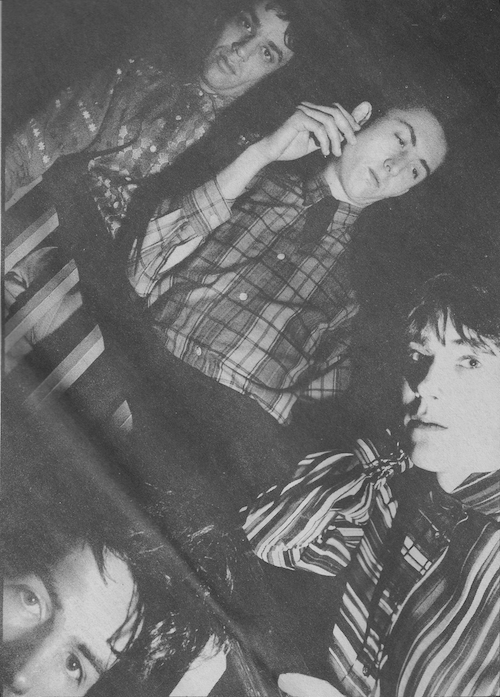
Deep in the homely heart of rural England, something rather strange is stirring : inside a quaint sandstone studio in the middle of arctic Oxfordshire, a gang of five are working long and hard into the early hours. Talk Talk are busy recording their first album with producer Colin Thurston, a tight and intelligent team striding with stealthy confidence towards the new year’s first new pop masterstroke. The chances are that you have yet to hear Talk Talk. The likelihood is that you soon will. The southern quartet are already talking in terms of “when” rather than “if” their debut EMI single “Mirrorman” is a hit, already preparing to take their place on Top Of The Pops alongside Madness and Mode, Haircut and the Human League at the sharper end of a constantly shifting pop stage.
As a young group with no track record and no obvious tags or trimmings, the band are vague and evasive about what, if anything, they represent. For the moment, their music speaks for itself. Talk Talk produce credible pop that respects the Anglo-American traditions of the 60’s while simultaneously reaching out to embrace a mood and mode that belongs nowhere but 1982. It floats somewhere between a jazzier Teardrop and the deft adroitness of The Cure before they grew cynical and pretentious. It is catchy and instant, but not without its darker side; a gothic, almost celestial majesty.
Talk Talk are Paul Webb, Lee Harris, Simon Brenner and Mark Hollis - bass, drums, keyboards and vocals - a guitar-less line up that is well suited to the compact melodic grace of their material.
Breaking momentarily from their recording duties, Mark and Paul relax against the cork-carpeted walls of Chipping Norton studios and talk Talk Talk.
Mark: “The whole thing about this band not having any guitarist is to get the melodies across with more force. You’ve got a rhythm section to provide the beat, and keyboards to provide the melody, which they can do much better than a guitar. In a way, the line-up is closer to a jazz quartet than a rock band. “It allows us to put more emphasis on our songs. A lot of the stuff around at the moment relies too heavily on the arrangement and the production rather than the song. But those aren’t songs. They’re just arrangements with a couple of trimmings. I like bands like The Police who just keep it simple - a good, strong rhythm section with the melody coming from the vocals.”
Mark is the younger brother of Ed Hollis, the former Eddie And The Hot Rods manager-producer-songwriter, a family contact that was useful when he began his own songwriting career. Last summer, Ed took a rough tape of Mark’s songs into Island Music, the publishing division of Island Records, who were impressed enough to arrange some proper studio time. The aspiring young session players recruited for the task soon grew into a full-time band and Talk Talk were born.
Mark: “When we went in to do those demos, we had no intention of actually forming a band. I thought of it primarily as a publishing thing, but after only a couple of days, it was obviously going to work as a group. It was a real band after the first week. It’s not something that was thrown together by some management company.”
On the strength of that demo tape and a short series of live dates at the Blitz, Legends and Embassy in London in the autumn, Talk Talk signed to EMI in November. The only curious aspect was the noticeable absence of the customary press wind-up. Keith Aspden, meanwhile, had left Island Music to become the band’s manager and they started December on an extensive nationwide tour with Duran Duran. From deceptively low-key beginnings, things were starting to happen rather quickly for Talk Talk.
Paul: “We didn’t want to be over-exposed before we had signed a deal, so we kept things pretty quiet during the summer. Before the Duran Duran tour, we’d played only six live dates ! But if you spend months and months slogging your way round the clubs in London, you can make yourself too available to the A&R men. They don’t bother to come and see you ‘cos they know that they can always catch you somewhere else.”
While Mark and Simon are both from North London , the rhythm twins Paul and Lee are a product of the same Essex club scene that spawned Depeche Mode and the less illustrious if more bizarre Naked Lunch. The pair were lured by the dance-sense and dash of clubs like the fabled Goldmine in Canvey Island and Crocks in Raleigh rather than the grease and sweat of their native Southend’s traditional R&B scene.
Paul: “In Southend, there is this really strong real musicians clique, where you have to be technically brilliant. We never got off on that. We were always more interested in going out and having a good time than hanging out with musicians who were just interested in showing off their skills. The fashion thing is important too, but there are not too many people in Southend who are really into that, apart from the people in the club scene. There is the old R&B thing, which we never wanted anything to do with, although people still tend to lumber you with an R&B tag when they see that you come from Southend.”
With their first release in the EMI pipeline, Talk Talk are fast becoming aware of the importance of packaging and presentation, although with their artwork by Peter Saville and their clothes lying somewhere between Anthony Price and A. Rebours, they are in danger of being seen as one massive modern marketing cliché, going for the trendy names just for the sake of it.
Paul: “The thing is that these people are good. We had contacted Peter Saville before we signed with EMI and he saw us onstage before he was commissioned to work for us. It wasn’t just a case of going for the names. Those people are there because they are the best and I don’t see the point of going elsewhere just for the sake of it.”
The same could be true of producer Thurston, who first made his name as the engineer on Bowie’s ‘Heroes’ and has since worked with Magazine and Duran Duran. He could well be to 1982 what Hannett and Lillywhite were to 1980 and Rushent and Burgess to 1981 - one of the most influential producers of the year.
Mark: “Again, it’s not a case of just going for the name. If the geezer can’t deliver the goods, then he isn’t worth it. Most of the ideas are mainly ours. We still tell Colin what we want to be put over…”
Which is?
Paul: “We want the sound to be quite moody and atmospheric. The same goes for the artwork. The stuff that Saville is doing for us isn’t in the least like the classical sleeves that he has done before.”
Are they worried about placing undue emphasis on the package at the expense of its contents?
“No…because it is important. You can represent yourself visually through music and clothes just as well as you can represent yourself musically. I mean, Peter Saville helped put over the mood of Joy Division with his artwork, just as he did with Orchestral Manoeuvres. The packaging was part of them, an extension of the band.”
As the main songwriter in Talk Talk, Mark emphasizes the strength of the songs. In addition to the ‘Mirrorman’ single, he has assembled a strong and original set - ‘Talk Talk’, ‘Strike Up The Band’, ‘It’s So Serious’, ‘Magic Moments’, ‘Renee’ and ‘Candy’ - with the reflective, almost transcendental edge to his writing neatly balancing the pop punch of the band.
Mark: “I don’t think of songwriting as pure inspiration, just something that comes to you in a blinding flash. But it isn’t. You might get the germ of an idea like that, but you can sometimes try a hundred different ways of putting it into words and still come up with nothing. “I heard Anthony Burgess talking about his writing recently and he was saying he can spend six hours writing thousands of words and then throw almost all of them away. It’s the same with songwriting. It’s worth it for the stuff you’re left with at the end. The last thing in the world I would want is to be thought of as a disposable group. I want to write stuff that you’ll still be able to listen to in ten years time…still think of as a good song then.”
Listen, listen….and wait.
^ go back to topSounds: 6th February 1982
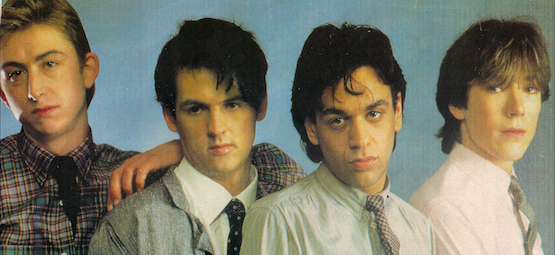
Incredible as it may seem, and is, Talk Talk sound like a supersession between Roxy Music and Styx. Strangely, these musos differ little from the majority of US MOR pop slagged here in glee weekly, yet some people seem to think they’re contemporary and saleable to the umpteenth degree. They are no doubt, because no big label invests unless they’ve consulted a lawyer. But all this doesn’t forgive how obviously Talk Talk are tailored for the US market; an Atlantic crossing must be forthcoming. Hard to imagine it charting, but then reviewers always say that about number one songs, so I’ll shut up The mediocrity is the message.
^ go back to topRecord Mirror: February 6th 1982
Ah yes, (this week’s) Next Big Thing. Wimpy synthesizers music with suitably ‘emotional’ (ie whingeing) writhing listlessly atop it. EMI would find it easier, methinks, to set the world alight with a damp boX of Swan Vestas.
^ go back to topSmash Hits: 18 February 1982
Ah ha - talent. Highly promising stuff from a new group that blends tune, interesting lyrics and comptemporary feel in a manner that suggests they know what they're doing and doing it right. Difficult to pigeonhole, easy to like.
^ go back to topSmash Hits: 15 April 1982
They're a might too close to Duran Duran for comfort. They share the same label and the same producer (Colin Thurston) who has given them a similarly smooth and well-spring sound. Try again boys, try again boys.
^ go back to topRecord Mirror: 17th April 1982
Watery reflections of Duran Duran and Simple Minds, a contrived looking image of pretty boys all in white - gee, is virginity making a comeback? - and that’s about the size of it. The next big what? Don’t make me laugh.
^ go back to topTalk Talk: Talk Talk Official Video - Version 1
^ go back to top
Record Mirror: 8th May 1982
To all frustrated 40 year old accountants reading Record Mirror Talk Talk are the group for You!
“I think they’d like us says Mark Hollis, the group’s chatty barrer-boy leader “But it doesn’t stop there. We appeal to all types. No section of an audience is more valuable than another.
Billed as The Next Big Thing and with a single of the same name and a freshly recorded album under their belts, Talk Talk reckon they’re ready to pounce on the unsuspecting public with a passionate package that’ll blow away the present dross.
But if their predictions are right, you re not exactly going to be falling about in the aisles when they hit the big time.
“Our songs are about tragedy...human tragedy” says Mark Mark. “Like the title track The Party’s Over that’s about someone who’s past their prime and won’t actually acknowledge the fact. They’re striving for what they used to be and looking ridiculous. It’s just the conflict between trying to attain something more than you are, which is a good things, and the parody of actually doing it. It’s just an observation. Tragedy’s what I feel most at home with. No, my life hasn’t been tragic, not in the least.
It’s not like Dexy’s. I think they went over the top with their passion thing. I really did rate them highly when they started. I just think they went past passions and into whimpering.
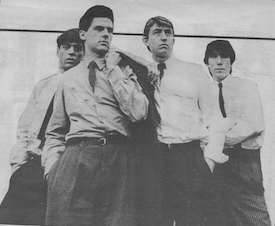
Talk Talk came together when Mark’s songs impressed their present manager Keith, who was then working at Island music At the same time Mark met Southend-based bass player Paul Webb and drummer Lee Harris. In their first week together they d written five songs Simon Brenner was added on keyboards, Keith packed in his jobs at Island, they played a few London clubs, got an EMI deal, went on tour supporting Duran Duran and release their first single ‘Mirror Man . Simple.
But behind the apparent ease of the operation, described in a West London pub by Mark, Paul, Simon and manger Keith Keith, is the serious business of being successful. With a confidence bordering on arrogance, these boys want a career and they’re not messing about.
“Yeah, we don’t want to be the obscure doo dah band” says Paul Paul “and just be trendy for about 10 minutes.”
“we think when you go on to do it, you got to do it properly” adds Mark “we want every gig to be a gig rather than just going through the motions.”
What form will the live shows be taking? “well we’ve got a lot of things in the pipeline that we’re trying out now…and basically Paul will be playing bass and I’ll be singing” Mark answers with a touch of sarcasm.
“We just want to make sure that it’s right before we do it and that’s why we haven’t done it yet” adds Simon Simon. Manager Keith comes to the rescue. “A polished musical show with good visuals. There’s going to be no snakes coming out of the stage or anything like that.”
Having got that clear, I venture to ask how they feel being hailed as the new Duran Duran. There’s a pause before Mark answers. “If I had some ears to graft onto them I would do it. You know, they’ll learn.
“We just can’t see the connection”, offers Simon hopefully “No way is there any comparison with what we do.’
“We’ve been compared to things like Roxy Music, Styx, LO and Duran says Mark “They’re well removed from each other. I mean sure, we’re all pretty”. I don’t think we’d ever describe our music in terms of other bands adds Lee “what we do is unique. We all come form such different areas of music that I don’t see how you could possibly put us in one category”.
Mark: “The thing that we’re really going for is strength, We want to add to that the strength in terms of writing but get it between the two so what we’ve got is totally coherent but powerful. I think the emotive thing is really important. It’s got to be felt”.
In the group’s record company blurb Mark is quoted as saying he wants to make music that we’ll be able to listen to in 20 years time. Dos he really believe that? “Sure, sure. I did write my first song 20 years ago and it still stands strong (giggles all round)…yeah, it’s the title track of the album”.
What was it like touring with Duran then?
“It was great for us” answers Mark “It gave a lot of people the chance to see us. The other thing that was great was that the Duran dates were all sell-outs. We were unbilled so everybody was going to see those gigs specifically to see Duran. We weren’t relying purely on delivery and on the strength of what we were doing and we came out of it well”.
Clearly Talk Talk are very keen on exposure.
“If people want to see you, why shouldn’t they do it” demands Simon “The Spandau ideal of never playing gigs when so many kids want to go and see them is ridiculous”.
Mark: “You know, I don’t think you should every treat audiences with contempt. You definitely get that with bands who rely solely on backing tapes to work their whole set. There’s just so much that’s coming off that stage that’s running off a Teac…for that they might as well sit at home and put a record on. I think it’s an insult. I’ve only ever seen one band who do it, purely because we played with them and that’s Depeche.” I mean I was quite horrified he adds with flat outrage. “To me a live show isn’t three people playing one finger synth lines. I think you’ve actually got a retain an element of giving somebody a performance”.
Talk Talk are confident that their time has come and if there’s an air of smugness sitting back with their feet in the air before they’ve actually done anything this is overcome by the strength of their material. They don’t just see themselves as another English electro band with a limited appeal. The music is the only thing that concerns them now.
“we’re all geared to the music” says Mark. “there’s nothing else involved at all That’s why it’s wrong to look at everything else and not the music because that’s what we do best”.
^ go back to topRecord Mirror: 15th May 1982
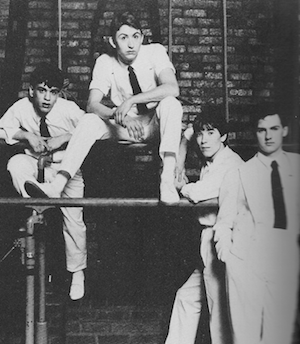
Full name: Mark David Hollis
Nickname: None
Date of Birth: January 4th 1959 (sic)
Place of Birth: Tottenham
Educated: Tollington Park
Height: Five foot, nine inches
Weight: nine Stone
Colour of Eyes: Green/Blue
First Love: Flick
First disappointment: Buying the sheet music to “Everlasting Love” and wondering where the horn arrangement was!
First Performance: Butlin’s 1968
First Live Show Seen: David Bowie
First Record Bought: Everlasting Love the Love Affair
Musical Influences: Burt Bacharach / William Burroughs
Instruments Played: Piano and Guitar
Hero: My dad
Heroine: My mum
Favourite Books: Down and Out in Paris and London by George Orwell, the Little Duke by Charlotte M Young
Favourite Films: A Clockwork Orange Singing in the Rain and One Armed Boxer
Favourite TV Shows: Bilko and Minder
Best live Show Seen: Shostakovich No 10 at Festival Hall London
Favourite Clubs: The Camden Palace
Favourite Food: Steak
Favourite Clothes: Paul Smith
Haircut: Smile at Knightsbridge
Favourite Drink: Gin
Ideal Home: A church in the West End
Ideal Holiday: New York
Ideal Car: Aston Martin DB6
Most Frightening Experience: Trying to work out the difference between Most Frightening Experience and Worst Experience
Worst Experience: Trying to work out the difference between Worst Experience and Most Frightening Experience
Funniest Experience: Getting mistaken for Stan Ogden
Superstitions: None
Fantasy: Drinking gin in my Aston Martin DB6 around New York
Most Hated Chore: I’ve never met one!
Ambition: To own a car.
^ go back to topZig Zag: July 1982
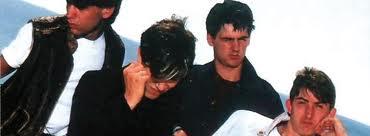
If you listen to the Kid Jensen show regularly, or you’ve popped into the infamous Zigzag Club recently, the name Talk Talk must ring a bell. For the ignorant among us: Talk Talk are a young electronic outfit, half from London (vocalist Mark Hollis and Keyboards player Simon Brenner) and half from Southend (Paul Webb, Bass, and Lee Harris, Drums). They started about a year ago, got signed up by EMI in November 1981, release two singles ‘Mirror Man’ and ‘Talk Talk’ and recorded and album, The Party’s Over, which is now due in July.
Their music is not unlike Duran Duran’s or so I thought, having to talk talk to Mark Hollis, didn’t seem exactly the most exciting occupation on a hot summer day. Fortunately Mark has quite a few surprises up his sleeve.
‘My basic idea was to have the same line up as someone like Coltrane,’ he says as it that was the most obvious thing in the world. Shock, horror! Is that the sort of music he listens to usually?
‘What I like about Shostakovich and music like that is that total oppressiveness in the force of it and then, at other moments, that pure sort of tranquillity. It’s between those two extremes. I the last couple of years there has been so much emphasis on image that it has become more important than the actual music. What we believe in is: ‘let’s go back to songwriting!’”
Are lyrics important to him? “Oh yes, sure they are! I take a lot of time on lyrics because I do think they are important”. Song writing is Mark’s job in the band. For the new album he wrote all but one of the lyrics and most of the music, either on his own or with the rest of the band.
Mark finally succeeds in convincing me that his cinematic references go deeper than ‘Girls in Films’ and he also tries hard to convince me that my reception of Talk Talk’s music as slightly ‘plastic’ is due to the quality of my sound installation. We wash away our last differences of opinion with a couple of drinks and rave about mutual favourites like Love, 13th Floor Elevators and the Velvet underground. Nobody who loves that holy trinity can possibility be ‘plastic’. Maybe I should change the needle on my record player. (Marianne Ebertowski)
^ go back to topRecord Mirror: 19th June 1982
There’s been a lot of idle chat about this band on the basis of once excellent single. ‘Talk Talk; was one of the most promising sounds heard in a long time, and after seeing them live, I’m thoroughly pessimistic about a follow-up.
It’s obvious that they have some good ideas between them, but they are perhaps trying to run before they can crawl. The band’s entire conception and record deal took place with such haste that they haven’t quite agreed upon how they want to sound and who they want to be. This makes them ever so vulnerable to influence, and without even knowing they had toured with Duran Duran I could hazard a guess. Their live show actually sounds like watered down Duran.
‘Talk Talk’ and ‘Mirror Man’ were everything to be expected, but nothing else in their set showed any spirit. The audience whispered for an encore, but in all honestly there was more interested generated by Talk Talk fellow label artist Thomas Dolby who stole the show just be being there. Such is the band’s stage presence. (Gill Pringle)
^ go back to topRecord Mirror: 17th July 1982
The Party’s what!!??? Hang on, I can see their point. Meticulously packaged as EMI’s brightest new pop-age futurists yet with two non-hits behind them, Talk Talk must be wondering if they haven t already shot their gleaming poisoned arrow.
Except there’s no poison, just the bland leading the bland down a foggy thoroughfare of synthesized nothingness. Okay, so they’re young and singer-songwriter Mark Hollis should get over his Ferry fixation and adolescent lyrics.
But there’s actually nothing here you haven’t head before, whether a mellotron doodled copped from the likes of the Moody Blues, or a reliance on machines that make Depeche Mode sound like an acoustic trio. Yet whereas the Depeche use their hardware to sculpt and fashion songs, Talk Talk treat theirs as a crutch, a smokescreen attempting to hide the complete lack of any hint of a catchy tune, a well conceived hook and so on.
Rather than regarding themselves as pretty boys - which is just as well - Talk Talk adopt the pose of serious artists but just end up making complete bozos of themselves. Agreed, there’s a limit to the extent you can write off a band on the strength (ie weakness) of their debut album, but if they are to get any farther these guys should seriously contemplate their roles in the universe as we know it.
(Mike Nicholls)
^ go back to topTalk Talk: Talk Talk Official Video - Version 2
^ go back to top
Noise!: 22nd July 1982
Mark Hollis, main man of much-maligned popsters Talk Talk, recently shot hotfoot to Hollywood on a crest of excitement surrounding their first British 45 ‘Talk Talk’. He was relieved to find there an atmosphere devoid of preconceptions about band, image or music.
Cockney Mark, talk-talking from sunny California, rallied against what he called ‘the idiot press’ back home, who have wholeheartedly condemned Talk Talk for the unforgivable error of signing to EMI and sharing a producer (Colin Thurston) with Duran Duran.
“It gets tiring to listen to the Duran comparisons” sighed Mark. “I can’t hear it myself. We purposely had a low-key approach, but we missed out ‘cos everything seems so geared to hyping. I get depressed about the whole thing kids ought to know about music, not image. When people hear the LP they’ll have more of a total idea about us”.
The album, called ‘The Party’s Over’ (see review) has a subtler, more atmospheric feel than the instant whip of their two 45s. Mark’s keen on conveying the message behind his lyrics which are very important in the Talk scheme of things.
“The title track ’ Party’s Over’ is about a woman who’s totally past it, but doesn’t accept it. It’s the conflict that exists if you aspire to be something you aren’t, and either you get respect or ridicule. ‘Have you heard the news’ is about being with someone who dies and feeling guilty at being with them.”
Pretty sombre, mood-wised hardly conforming to the ‘pretty empty’ electropop image the band finds itself with. But Mark has always seen Talk Talk in terms of mood.
“On the cover of the first single we worse all-white clothes. The whole idea behind that was the music being opposite to the colour and us getting up and singing about hate, dressed up whiter than white well I s’pose I wouldn’t have seen it. But when the single came out everyone reviewed our clothes. They’d be better off working in C&A!”
Talk Talk a name chosen for its directness, because it speaks of communication. But they may not always be as they seem. Illusions are a recurring Talk Talk theme.
Peek at the sleeve of new 45 ‘Today’ and you’ll see a pair of blue lips. Look at the LP cove r and discover it’s not a mouth but a surreal weeping eye part of the powerful imagery of illustrator James Marsh.
Talk Talk look look again. Spy them soon, touring colleges near you and at London’s venue on July 22. Last word goes to critics’ whipping boy Mark “It’s nice to talk about something other than my white suit!”.
(Betty Page)
^ go back to topNoise!: 22nd July 1982
It’s amazing how blind people can be when they want to. Even your humble scribe was put off by prattlings about plastic Durans, lack of image, etc. In fact there s more to Talk Talk than idle comparison.
The album is, as Mark Hollis insists, an album of moods. Sample the punchy, memorable pop of ‘Talk Talk’, the dark synth-balladeering of ‘It’s So Serious’ and Mark Hollis’s distinctive Welleresque vocals. He injects pathos into his delivery, and the arrangements show a lot of thought.
Some tracks gloss over the ears at first, but the dreamy feel penetrates after a few spins, with an overall atmosphere not dissimilar to the sad poignance achieved by Icehouse. Personal faves are the wistful ‘Have You Heard the News?’ and the slow, smouldering ‘Mirror Man’. If you commence from the viewpoint that nothing in pop music is original, ‘The Party s Over’ could be the experience you’re seeking.
(Betty Page)
^ go back to topSounds: 24th July 1982
I heard demos of Talk Talk ‘early on’, and they were nice in a peculiarly old-fashioned sense. Perhaps it was Talk Talk’s connections with Ed ‘Eddie and the Hot Rods’ Hollis, the Southend producer supremo who geared into Talk Talk, and particularly his wee brother Mark, the leader of this bunch, a pleasantly rocky jarring effect that belied their would-be ‘futurist’/Sons of Duran Duran (is this medically possible?) links.
Unfortunately, scrub all that out, for ‘The Party’s Over’ is a mess. Talk Talk have been reduced to a severe Limp Limp with production and arrangement the central, crippling problems. Where was brother Ed when the lights went out?
Talk Talk try to go all twee Marc Almond, or wispy Duran Duran or, now and then, they have a forsake-all stomp into ELO country. There’s nothing to hang on to here at all, the sound is far too trebly in a production that is far too large for these meagre songs. Everything’s a half measure in the end. They would go for that swirling, ‘Wuthering Heights’ windy sound but they don’t quite; they would go the whole hog and hug the Duran and teeny song possibilities but they never do. The compromises are endless.
Talk Talk are old fashioned and they think sluggishly. They’re living in a world where the Pleasers are household names. I feel they’ve got something distinctly better than a Classix Nouveaux, whom this pompous twaddle closely resembles in its sheer unlistenability and in its laughable pomposity. It’s probably Marco Hollis himself who, on a ‘Talk Talk’, or a ‘Mirror Man’, hints at a grain of songwriting worth up there somewhere. But he has an awful degree of nonsense to get rid of before anything relevant would shine through.
It’s meriting of an additional if not too further bruising a note, to add that Hollis’s lyrics reflect a general half-heartedness in Talk Talk’s debut debacle. They are just not up to scratch for summer ’82, and I have to close by contradicting the pleasingly crass EMI handout and saying...this ain’t worth much, um, Talk Talk (groan groan)…
Dave McCullough
^ go back to topSmash Hits: 22nd July 1982
You don’t have to sound sombre to seem serious but TT feel that they have to do just that. One sad mood permeates the whole LP as though they’re compensating for the fact they they’d like to say something important but can’t think of anything to say. Still, attractive tines and synthesizer phrases plus sliding bass-playing prosper in the big, careful production. If only they’d cheered up, the party might have been much more enjoyable.
(Neil Tennant)
^ go back to topRecord Mirror: 31st July 1982
It’s been a year since I first saw Talk Talk make their way into the world. A year that’s seen them sign a major record deal, flirt with the top forty and release an album of rich promise and ambition. It’s also been a year in which the group have learnt to accept the fickleness of the music press and the fallibility of their record company.
For although Talk Talk’s ascent has been fairly smooth, the group have been plagued by ill-considered reviews and faintly ludicrous comparisons with other groups. However, with the current single ‘Today’ set to become that illusive first hit and a Stateside tour with Elvis Costello ready to consolidate the considerable ‘buzz’ about the group in America, Talk Talk are set to smash the criticism and importing their own personality onto the nation’s pop consciousness. Before I go further, let me just say this: Talk Talk are going to be a very BIG group.
Talk Talk’s music is built around stirring, insistent melodies and the sharp songwriting talents of vocalist Mark Hollis. It’s a lush sound, saturated with sweetness and emotion; evocative, ethereal, yet still anchored by a winning pop sensibility yet if the group have a drawback it’s the danger of their music becoming just TOO soothing, too pleasant and dangerously close to American FM radio fodder. Talk Talk have no guitarist; operating with keyboards, bass and drums they aim to build their melodies around a loose, almost jazzy structure. Yet isn’t there a danger of becoming too soft-centred, lacking cut and aggression? Vocalist Mark disagrees.
“I just can’t honestly see that, listen to a song like ‘Hate’ for instance, you don’t need guitars to sound aggressive”.
Mark Hollis is a very intense young man, sharp, angular and wonderfully Cockney, he has a passionate belief in his songs and the group’s future. For a man fronting a modern pop group Mark has refreshingly old-fashioned ideas. I non in agreement as he berates the current obsession with packaging and image. Mark Hollis wants his songs to stand on their own, not on the colour of the group’s latest suits. I note the difference between Talk Talk’s dance orientated singles and the more considered epic pop on the LP.
“We aim to be as diverse as possible, to cover all sorts of areas. Of course singles have to be immediate, instants, we can do that, but we also wants to write albums that stand as albums not merely a collections of singles and dud filler tracks”.
Their debut LP. ‘The Party’s Over’ certainly reaches for these aspirations, yet to this writer, the results are not always completely successful. Talk Talk are aiming for an epic pop sound built around flexible musicianship and traditional song writing, it’s an ambitious combination most fully realised on the LP’s title track, “The Party’s Over’ a winding, skilfully woven dialogue of love and despair. “This was the newest song at the time of recording and in terms of development it’s closer to where we’re going,. It’s the story of a women who’s past her peaks but doesn’t realise it, really it’s about aspiring for greatness and the ridicule you get for doing it”.
A personal gripe Mark? Hollis’s lyrics deal with hurt and despair, do they come from personal experience?
“Not really, they’re just observations of people, you don’t have to experience something to write about it”.

Throughout this conversation bassist Paul’s main preoccupation has been marshalling various young ladies of his acquaintance and searching for a phone box to reach the lovely Vicky. Drummer Lee reveals respectably diverse listening habits everything from the new Cabaret Voltaire LP to classical music, while classically trained keyboards man Simon maintains his reputation for silence and politeness. Hollis may be the mouth and motive force, but his assurance and confidence are certainly bolstered by the fact that he has three very talented musicians to work with.
Because they strive and search for the best, Talk Talk are worth far more than most new pop. They haven’t quite made it yet, but for a group of just twelve months standing they’ve spun some infectious pop and release a very creditable debut LP. Remember it’s the quest that’s important. Talk Talk know this, but I wonder how many of their competitors do?
Jim Reid
^ go back to topRecord Mirror: 7th August 1982
Porgy and Bess - Miles Davies (directed by Gil Evans). It’s got a good beat.
Metal Machine Music - Lou Reed. Great for a Party.
Tears of a Clown - Smokey Robinson and the Miracles. Great for getting rid of people at a party.
Seven plus seven is - Love. I like a bit of jazz.
Concierto de Aranjuez - Regino Sainz de la MAza. Superb lyric.
Harlem Shuffle - Bob and Early. I like songs about card games.
Snow in San Anselmo - Van Morrison. Maybe if enough people liked it he could buy a car.
In a sentimental mood - John Coltrane. No explanation needed.
Try a little tenderness - Otis Redding. Great.
Carmina Burana - Carl Orff. Great for waking up to and relaxing over breakfast.
^ go back to topSmash Hits: 18th August 1982
Bit of an abrasive character, this Mark Hollis from Talk Talk. Halfway through our chat, I innocently mention that they’re often compared to Duran Duran, the band they supported on last year’s tour.
“Look, I just want to say two things,” he explodes. “First, I don’t think it’s a fair comparison. People who say that obviously haven’t listened to us properly. Duran Duran’s overall sound is just bass drum.”
“Secondly, we’ve been compared to 11 different bands! It’s got to the stage that I’m really wary of mentioning other bands in case our name gets associated with them.”
And then, with disgust in his voice, he begins to list some of those names: Simple Minds, Echo and the Bunnymen, U2, Air Supply, Roxy Music, Original Mirrors, Styx, The Jam … “and we haven’t even got a guitar, you know what I mean?”
All right, all right. Point taken. Back to basics then. Mark left school half way through his A-levels (“I just, like, had a few hassles with things”) and for a while did “just factory jobs”. He ended up hawking some songs round Island Records, looking for a deal. His brother Ed was at the time doing some production work in Southend with bassist Paul Webb and drummer Lee Harris. He suggested they work with Mark and the three came together. Island were interested and forwarded some money for a publishing deal that financed some demos and rehearsals.
Keyboard player Simon Brenner was enlisted, and Talk Talk was born. They did five gigs in trendy London clubs, had a Kid Jensen session on the radio and - bingo! - a record deal from EMI.
Their first single in February this year, “Mirror Man” went largely unnoticed. Their second “Talk Talk”, itself got to number 52. That might not sound so impressive, but at the moment the record is a hit in France, Canada and Portugal, is threatening the charts in Australia and has been well received in the US of A. Talk Talk are doing OK.
So who would Mark Hollis like to be compared with, I wonder, trying to calm him down a little!
“Well, in terms of singers: Otis Redding. He combines real power with tenderness. Songwriters: Bacharach and David. They were so consistent over a long period of time. Arrangements: John Coltrane. As for contemporaries, I can’t actually listen to things like the Human League because they’ve been played to death. But I think they’ve made really good ground.”
“Those are the people I admire.”
He cites the Talk Talk philosophy as being “as diverse as possible while retaining an original sound.” And the group’s ambition as “to be able to feel that we’ve always got more to do.”
Just now, they’re about to go off to the USA. Part of the interest in “Talk Talk” is that it’s going to be used in Night Shift, a film directed by Alan Ladd Jnr. (husband of Charlie’s Angel Cheryl Ladd).
They’re also going to support Elvis Costello on his next tour. Does that mean they’re going to be compared with Elvis then?
“Yeah,” ponders Hollis moodily. “That’ll probably be another one for the list. It wouldn’t surprise me.”
Meanwhile he’s happy just working. “It’s what I most enjoy. Otherwise I’d be really bored.”
^ go back to topSounds: 30th October 1982
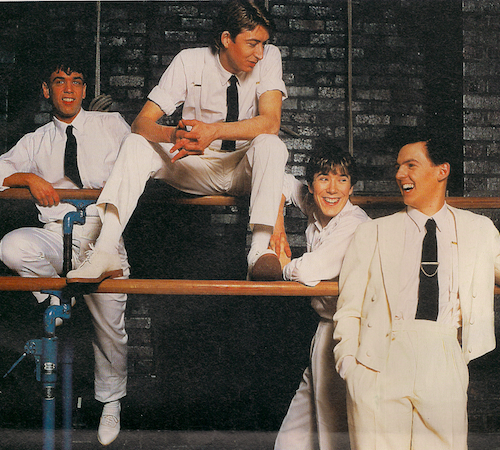
Tony Mitchell talks on the wild side in LA with Talk Talk.
Jetting from the electric buzz and non-stop ecstatic clubbing of Manhattan to the scorching soleil and numbing pooldom of El Lay in one day is akin to having all your senses doused in stagnant water. You feel like a cold blancmange with sunburn.
This is how one was suffering as the icy-cold first confrontation with chart enigmas Talk Talk commenced. They were trying to enjoy their first day off after six weeks’ solid Stateside touring (bar one crazy virtual day trip to London for TOTP) lying sunbedded around the pool of the Sunset Marquis, and the signals they transmitted were those of discomfort, vulnerability and defensiveness to the point of hostility.
I felt snubbed, wound-up, progressively more cynical. You may by now have guessed that this was not going to be one of the most gratifying ongoing interview situations ever.
Mark Hollis, Talk Talk vocalist, lyricist and therefore foremost spokesperson, was in an exceedingly acerbic mood. Lee, Simon and Paul (Harris, Brenner and Webb), were at least temporarily tongue-tied and laid-back.
Fortunately time, the great healer, came to the rescue. Barriers gradually receded as the fearful foursome grew to accept the notion that every interview was not per se a stitch-up job. Backstage tomfoolery before and after their last West Coast gig at LA’s supposedly prestigious Country Club venue did much to melt the ice, and coffe’n’coconut cookies in the Sounds hospitality suite back at the hotel broke their remaining reserve. After twelve hours or so of intermittently circling each other like mongoose and cobra we were finally pals.
Why, we even dropped everything to catch the same plane as them back to New York the next day and Mark returned the compliment by sparing 45 minutes in flight for a much more affable interview. Just what had got their hacks up on this sunny Sunday afternoon in Tinsel Town, to give us such a frosty welcome? First and foremost - the fact that what precious little press they’ve had in the UK has mainly written them off as nothing more than plastic replicas of Duran Duran - a wicked joke, really, since the two outfits have nothing more in common than their double-barrelled names. Secondly, that journalists who treated them respectfully in interviews have gone away and stuck the knife in, twisting it deep. Thirdly, that the circumstances of our initial encounter were ill-conceived for a number of reasons too trivial to detail individually.
Above and beyond all else, it seems, Talk Talk desire to be taken seriously, and feel that they haven’t been, at least by the press so far. However, with a top 20 hit under their belts at the tender age of six months (vinyl-ly speaking) the importance of that particular parameter of credibility must be decreasing.
‘Today’ charted in the UK purely on its strength as a song. The band had no image, visually, or personality-wise, to precede them, and any preconceptions about their music which might have been engendered by the dubious Duran Duran comparisons cannot have worked seriously against them.
Interestingly, for a band which does have such a clear musical identity, Talk Talk were very much an accident of fate. For when Mark Hollis first got together with the other three, it was with the sole intention of recording some demos with which he hoped to secure a publishing deal - as a songwriter rather than a group member.
Mark’s brother is Ed Hollis, better known as Eddie of Hot Rods fame, and it was he who put bassist Paul and drummer Lee - a couple of club-lovin’ Southend lads - in touch with Mark when Island Music showed an interest in some proper demos of Hollis Junior’s songs last Autumn. Keyboard player Simon was roped in via another route, and what started off as a bunch of sessions ended after a fortnight as a committed band.
“Within a couple of days of working a bit on the stuff I’d done, we actually started writing things together as a band, and although all of us were from very different musical backgrounds in terms of taste, there was a definite unity of directions. After the first week we stopped thinking in terms of me getting a publishing deal and said, let’s call this a band.” Mark recalled.
The first person Mark met in his dealings with Island was Keith Aspden, who soon left the company to become Talk Talk’s manager and helped to negotiate their recording deal with EMI. “My idea is that a band should be able to develop constructively, like Bowie,” explained Mark. “Regardless of whether your next thing is considered better or worse, it must be a positive development. “That’s what is crucial to it, and it was very apparent to me that EMI would have the sort of foresight and size to actually understand that when it arose. “It was a very methodical reason for doing it. If this is to be a proper career, I’ve got to do it with a company that also believes it’s going to be a career.”
Why the choice of one of the song titles as the band’s name? “The track was up there round about the same time as the band was actually formed. We went through the dictionary, had all the novels out like William Burroughs and things, and finally ended up with Talk Talk because, partly, I like the idea of a track with the same name as the band, and I think it’s really instant in terms of memorizing it, plus it didn’t in any way categorize us. “The third reason was from a graphic point of view it would look good, the fourth one, purely from a personal hang-up I’ve got is got, is that I don’t really like it when people abbreviate it, like The Stones.” And the fifth one was that he really liked Duran Duran. Ouch! - only joking Mark. Is it true they’re supporting you on your UK tour though?
Early this year, the band went into the studio to record their first album, ‘The Party’s Over’ with producer Colin Thurston, who also happens to be Duran Duran’s producer (shock, horror!). From the band’s point of view it was not a totally successful pairing.
“I thought he’d be good because he’d worked with Bowie on ‘Heroes’ and that track is one of my all-time favourites, but the immediate problem was that he was trying to lay back our sound. “Colin wanted to soften it out too much so what we actually did was that we got Mike Robinson in to do the mix…he was actually the engineer on the first David Jensen session we’d done. Bearing in mind the sort of band he likes - very forceful - we thought he’d harden the sound up, give it more attack.” And it is attack - edge - which that album lacks, even after Robinson’s fire engine job. How much it lacks is not really evident until you see Talk Talk live. Live, the almost choirboy character of Mark’s voice is counterbalanced by his passionate delivery, by Lee and Paul’s forceful rhythms and by far more dynamic use of Simon’s synthesizers.
The result is an excitement barely hinted at by the album, even though the songs themselves are unmistakably quality artefacts. But if the power of a Talk Talk live performance is not readily evident from the first album, then neither are Mark’s musical influences, which turn out surprisingly to be a combination of jazzers like Coltrane and Ornette Coleman, plus the most soulful singer of ‘em all - Otis Redding. Mark : “Redding had two qualities. One was that he could naturally sing - he was naturally talented - and the other was that he understood power. And he just gave it everything. “For any music to be good, it’s really important that it’s got power, emotion, that it’s felt, basically. The minute it runs outside then it’s cabaret - that’s the only word for it.”
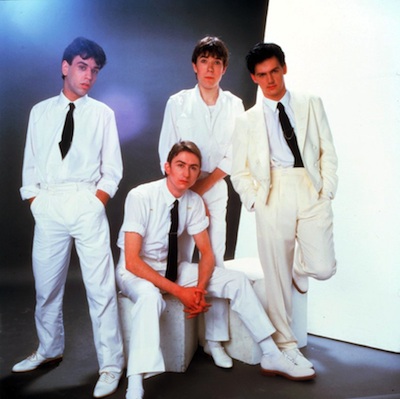
Needless to say, Ed Hollis was a powerful influence on his brother’s musical education. “Firstly,” explained Mark, “because of the fact that he’s a few years older, the type of music Ed was listening to was obviously stuff I’d never heard of, so when I was maybe 13, he was playing me music that otherwise I’d never have had any chance of listening to. At the same time, because of his work around the Hot Rods and his involvement within music, I could actually observe the whole situation from very close quarters.”
“And he was actually instrumental in the way the band formed, in that it was him who spotted Lee and Paul, and suggested they should come and work with me. I don’t think of myself as following in his footsteps - I think of him as showing me a good example. His record collection is extremely extensive so I was getting to hear things like Coltrane. He was the one who’d say ‘listen to this and see what you think’, and what he’d actually do would be to make a conscious effort to actually work me into it.”
“Maybe he’d start me off on someone like Coltrane, fairly melodic, and then he’d get me up to things like this Ornette Coleman album when you have a quintet playing in the left-hand speaker, a quartet playing in the right-hand, and you can listen to either of them individually, or the whole thing as one weird-out. So he’s been really instrumental in a lot of things.”
The idea Mark formulated for his group was thus based on the classic jazz line-up of keyboards, bass and drums, an involved a rhythm section that would combine dynamics with melody, keyboards very much as a backdrop and the vocals as a saxophone. He still thinks of his voice as an instrument; lyrics always come last and with as much emphasis on sounds as meaning.
Mark hopes the second album will be produced by either Chris Thomas or Rhett Davies : “It’s that thing off getting as close as we can in clarity and quality of vocal, but keeping the rhythm section hard and driving. That’s what we all want.” He also feels that the synthesizer content should be less stated than on ‘The Party’s Over’ to avoid getting caught in the trap of being labelled as just another synthesizer band. Paul echoed this sentiment : “Me and Lee have always been club goers. We picked up a lot of rhythmical ideas from New York clubs like The Roxy Roller where you’ve got dance rhythms working much heavier than, say, The Palace in London where it’s quite lightweight, and we hope to incorporate them in the new songs. “That’s the first thing that’s impressed us for years - to actually see it done with a bit of feeling. Culture Club and bands like that are trying to do it, but they just don’t make it at all.”
The majority of the band’s Stateside sojourn was spent opening for the second half of the Elvis Costello tour - the Canada/Florida leg. They found Costello’s fans, old and new, made an agreeably accessible audience. They headlined on a couple of East Coast dates, shot back to London to answer the call of the Beeb and zoomed over to LA in a haze of jetlag to play six West Coast dates which were reduced to three to fit in an appearance on the Merv Griffin show, which is a bit like the Johnny Carson show, but without the wit. But it meant valuable nationwide exposure as an example of Merv’s policy of giving the thumbs up to the noo wave (the noo wave should be so lucky) and reinforced the band’s video appearances already clocked up on MTV. “Gives ‘em something better to talk about in the evening than General Hospital” observed Mark, drily.
Talk Talk - Talk Talk (Live At Merv Griffin Show 1982)
LA gigs prior to the country club had been The Palladium, supporting Sparks, and two sets at Magic Mountain, one of California’s best-known amusement parks. I missed these concerts, but the band didn’t seem to mind - Magic Mountain is not exactly a showcase gig - bands who play there are just part of the scenery: “By the time you’ve played two numbers, if you’re not more exciting than the rollercoaster, half the audience just shoots off,” quipped Mark. However, the concert at The Country Club was every bit as energetic and slick as the one I’d seen a month or so back at The Venue in London a month or so back, before Talk Talk had taken on this gruelling American expedition, and the place itself was similar to The Venue in its original incarnation as a rock’n’roll supper club.
The fact that the audience were a bunch of dorks, and the assorted LA music biz types who filled the post-gig ‘reception’ were hardly any improvement, meant that we Brits ended up taking refuge together as if against a common enemy. New bonds were formed and a determined effort made to sink the $50 backstage bar allowance.
Would this and other American experiences be likely to influence their songwriting?
“I don’t think were that deep,” guffawed Mark. “I don’t think we’ll become that serious. Of course, because you’re away for six weeks you hopefully have a lot more impetus when you get back to rehearsals.”
Just what were their feelings about contemporary music at home?
Paul: “It’s really sad that so many bands in England aren’t really playing live - they’re just a total media thing. I’m sure it’s going to change ‘cos that excitement you can get from a good live gig you can’t beat, I don’t think.” Mark: “With all this reliance on the drum box thing and the tape thing, a lot of bands are becoming studio bands instead of real bands. That’s one of the things we’ve made a real effort to steer clear of by using a legitimate rhythm section.” Paul: “In England things are getting produced so well, so many good sounds are coming out, that the arrangements are suffering. They’re relying too much on an under-par song happening in the studio.” Mark: “You can have a band like Dollar who everyone takes for granted are absolutely rank and suddenly they’ve got the perfectly produced pop single…and it’s still totally rank. I’m sure The Wombles could get credibility now.”
So which British bands did he think were worth their salt currently?
“I like Echo and the Bunnymen a lot, I think they have that force which is good…and I think U2 have got that too, although I prefer their first album. They understand excitement. There’s a natural tendency now to want music which is more competent, but that energy and force should still be part of it.” Simon: “There are very few people like Bowie trying new things out. There’s a lack of people you can respect. You like songs and singles, but you could never sit down and listen to a whole album.” Paul: “Very few bands in England are consistent. I think The Human League are - they are very talented - and Simple Minds. But it seems most bands only last as long as their single. They’re turning over really quickly. There’s no room to develop your sound when you’re only hip for about five minutes.”
That, of course, is a problem Talk Talk trust they won’t be encountering. Getting a hit with your third single might not exactly be overnight success but on the other hand it’s far less likely to be just a flash in the pan. The band are happy that it’s happened now, as Paul explained: “There’s not so much money around now and you can’t hold a product for as long, I don’t know how much further we could have gone if ‘Today’ hadn’t been successful. You can’t go on for another year like that. “But at least we’re not going through what ABC are going through, where they haven’t done a live gig ever and now they’re going on stage for the first time at the Hammersmith Odeon.”
I came in search of character - and eventually found it. They were initially convinced I was going to screw them up, portray them as being solely into sitting by LA swimming pools, with burgeoning tans, but hopefully this first serious glimpse of what makes Talk Talk tick has hammered the lid down on silly speculation as hard as that single charting has. They do have a need to be taken seriously, but that doesn’t stop them from being amiable or fun-loving. The quartet were finally persuaded to pose for pics outside the infamous (Members Only !) underwear and fetish house ‘Trashy Lingerie’ and also to make a right old hash of their revolting American mega-breakfasts in the legendary coffee shop on Santa Monica Boulevard, ‘Dukes’ (pronounced ‘Dooks’, or course).
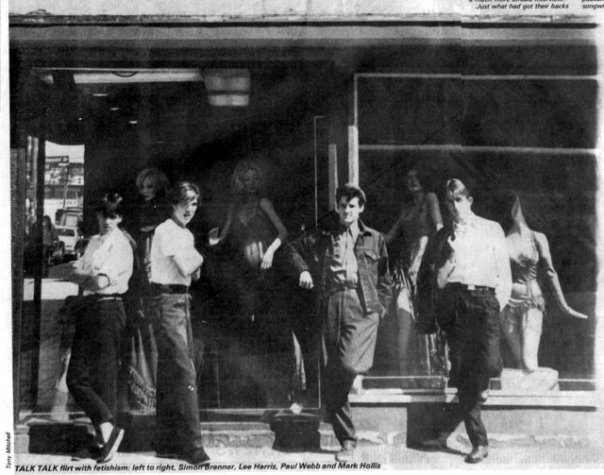
Talk Talk at Trashy Lingerie, Los Angeles
Well, you’ve got to laugh anyway when the bands got the one and only Burt Ward (Robin, Boy Wonder, to you) selling their T-Shirt consignments at gigs, and a drummer with a ponytail that sends little girls wild….
That at least should provide a Talk-ing point for the months to come…
^ go back to topNoise! 11th November 1982
Bands always complain about being misunderstood, misrepresented or just plain missed out, but virtually none have had such overwhelming reasons to moan as Talk Talk; all they’ve every had from the UK music press is a wholesales thumbs-down. But, despite this, with absolutely nothing but the courage of their convictions and their songs to champion the cause, after just three singles they’ve had a hit with ‘Today’ and are about the embark on a headlining British tour. So they have every reason to put a large two fingers up to the hacking fraternity and they kind of started on me…
I genuinely enjoyed TT’s LP “the Party’s Over’ and was anxious to find out what kind of personalities lurked behind those unyielding promo photos. Thus it was with an open mind and absolutely no intention of mentioning Duran Duran that I jetted into Los Angeles to catch the chaps during their six week US tour.
In the quiet of the trendy Sunset Marquis hotel, I awaited the interview summons from vocalist and band spokesperson Mark Hollis. When it finally came I was confronted with four swimming trunk-clad bodies sitting round the pool, trying to catch a little sun on their first day off in ages. Mark kindly remembered the favourable review I’d given their album, but that didn’t mean any of them were falling over themselves to do an in-depth band probe.
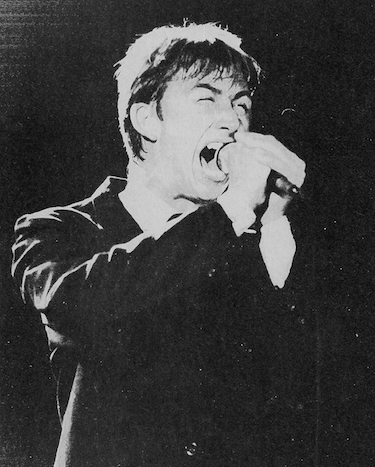
I pulled up a garish yellow sunbed and began to roast. The atmosphere was awkward and uneasy, with lee Harris, Paul Webb and Simon Brenner leaving Mark to do most of the talking, having half decided I was likely to be doing a stitch-up job. Mark, meanwhile, was busy displaying the drier side of his humour, giving little way and generally taking the piss something rotten. Here’s an example of a defensive, cynical interview situation - you supply pregnant pauses.
Q: Are you pleased about the way things have gone for you in England?
A: Mark: It’s good….it’s also interesting the way people change opinions about what we’ve been. I expected it but it’s quite funny when it happens.
Q: What sort of image do you think you have in America?
A: Mark: I don’t think it matters. They just like to listen to us. Sure they prefer us to be this age rather than bald, but….”
Q: What sort of audience do you attract?
A: Mark: Basically people who think they’re highly contemporary
Q: What do you feel about the way the UK press has treated you?
A: Simon: The press there interview us, take us seriously, then write articles that make us out to be some sort of joke, that we’re not serious about what we’re doing.
Q: Is it important for you to be serious?
A: Simon: It’s important to be taken seriously, to us
Paul: It should be about the music, not the clothes you wear
Simon: A bad journalist would say that this (the pool) is what Talk Talk are about. They were taking us out of context in England too.
Mark: It’s all over now, all in the past. The fact that the single charted really hammered the lid down tight.
Q: Who is supporting you on your UK tour?
A: Mark: Duran Duran!
Q: Will America influence your songwriting?
A: Mark: I don’t think we’re that deep! We won’t become that serious. We’re on a bus for the whole tour so we couldn’t really do anything unless we go acoustic and I can’t really see that…
Q: So you’re off to New York to do the Merv Griffin Show?
A: Mark: Year, we do ‘Talk Talk” and ‘Today’ in the Ed Sullivan Theatre on the stage where the Beatles and Elvis made their first American TV appearances. Great innit?
Paul: What are you trying to say Mark?
Mark: The only thing they’ve got in common is that Elvis and John Lennon are dead.
Paul: That’s a bit heavy.
Mark: We, we are being serious here.
Q: What do you say to any comparison with The Jam?
A: Mark: I don’t see it. Does it really matter?
Simon: Being told you’re an imitation isn’t a compliment.
Bloody miserable, eh? Later on, manager Keith was asked why the band are so defensive in interviews. He said he’d told them not to be and not to worry about it, Luckily for all concerned, things soon changed for the better. We drove down to Rissmiller’s Country Club for their headlining gig and went straight backstage to say hello. Mark was tense at first, ordering a dressing room evacuation because he needed some time alone before the gig, but Paul was the first to loosen up. He turned out to be a bit of a lad and regaled us with stories about his New York clubbing exploits. Having ascertained I was kosher, it was all hunky dory.
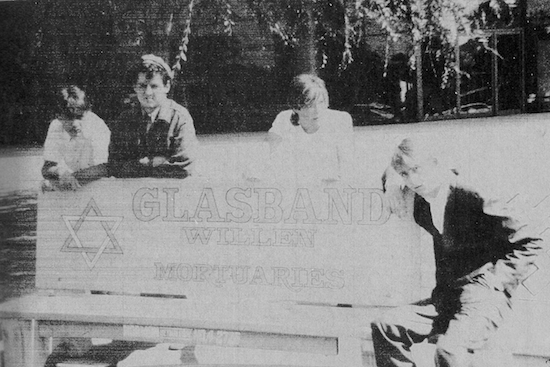
Talk Talk at the Glasband Willen Jewish Mortuary, Santa Monica Blvd, Los Angeles
Down in the supper-club confines of the venue, I witnessed TT deal out a very polished, professional but powerful set, every cog turning fluently and melodically, Mark’s face screwing up as he put his all into his delivery, fists punching into the air. It didn’t matter that half the audience were gawping dorks, the band’s satisfaction in playing was obvious and the exuded a special kind of excitement, even in that stagnant atmosphere.
Post-gig euphoria came quickly, even thought the show wasn’t rated highly by the band. But they were buzzing and friendly, showing their lighter side and imploring one and all to forget that abortive first encounter. The place, timing and mood were all wrong, Mark admitted. The final barrier was broken, we proceeded to get on like the proverbial blazing house.
We all rose bright and early the next day for a lightening photo session. They obviously didn’t feel relaxed posing for pix, but the foursome were coaxed down to Dukes, famed mega-breakfasterie on Santa Monica Boulevard, where they all had childish fun crafting piles of ‘cack’ out of unwanted man-sized brunches. After a short stop outside the infamous ‘Trashy Lingerie’ to pose by suspender-clad dummies, a final location was found outside the shining blue Pacific Design Centre. Then a mad dash was underway to get the band on their 1pm flight to New York.
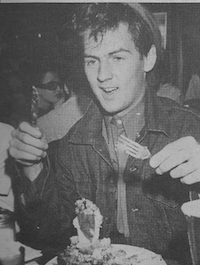
Due to reasons outlined in the Soft Cell feature, it finally turned out that we all ended on the same Pan Am flight to NY. This happy coincidence provided the perfect opportunity for Mark to make amends for the poolside debacle and have a more helpful chat about what makes Talk Talk tick. A fact not widely broadcast is that Mark’s brother is Ed Hollis of Eddie and the Hot Rods fame. Ed was more than just a passing influence on his younger brother’s musical development as Mark revealed.
“When I was about 13, Ed was providing me with listening material outside what I normally would’ve heard. And I was allowed into the set up of seeing music taking place that otherwise I’d never have got to see. It was he that actually spotted lee band Paul and suggested they should come and work with me. He was the one who got me to listen to Coltrane and Ornette Coleman, the stuff I was listening to around the time that band formed. People like Coltrane always had arrangements really sussed so you could put real ups and downs in. So people I rate highly like Otis Redding work between extremes of real hardness and gentleness rather than on a flat”.
Unusual influences, certainly. Was Mark worried they might label him (and therefore the band) unhip? “It’s what I like, the only way I can really relax and listen to music outside of working. A lot of ideas on there don’t get covered or even looked at in the field we’re working in, and I think it’s better to listen to stuff outside that than to be contained in the one things all the time. That’s why I think people like Bowie have got strength because they do look to other areas”.
How about tastes in contemporary bands? “I like Echo and the Bunneymen a lot, I think they have that force, which is good, and I think U2 have that too, they understand excitement. The whole thing that was important to me about the whole British punk movement was that it brought back enthusiasm and adrenalin into music and it’s a real shame if that gets neglected ‘cos it’s a really important part of British music. There’s a natural tendency now to want music which is more competent but it’s important that that sort of energy and force should still be part of it.”
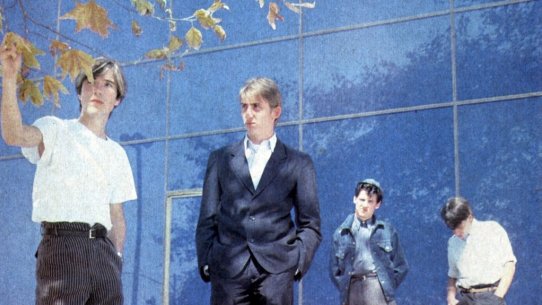
Talk Talk at the Pacific Design Centre
Initially Mark was working as a solo artists and there was never originally any intention of there being a band. Mark: “This is where Ed comes in again - he took some tapes I’d done to Island Music, looking towards a publishing deal, and that’s when he got Lee and Paul to come in and work with me. Simon came in by another means, and in that first week of rehearsing and demoing we actually started writing stuff together as a band. Although all f us were from very differing musical backgrounds in terms of taste, there was a definite unity in the type of direction we wanted to go towards, So after that it was let’s call this a band”.
How come they ended up with a name the same as one of their tracks? “They happened at virtually the same time. We went through the dictionary, had novels out, all that stuff, but the reason we ended up with it was firstly I like the idea of having a track that has the same name as the band. I’m not sure about having tracks that are considered your anthems ‘cos with time you wanna develop further on, but I do sort of like the idea. It’s really instant, I think, and it doesn’t categorise us. Also you can’t abbreviate it - that’s something I’ve got a personal hang-up about!”
Following a Jimmy Miller (of Jumping Jack Flash fame) produced demo, a few select gigs and a David Jensen session, Talk Talk soon signed with EMI, the company Mark reckoned would have enough foresight to see the band as having proper long-term careers. But problems started when Colin Thurston (yep, labelmate’s Duran’s producer) was brought in to produce the band’s debut album.
“I thought to work with someone that’d been involved in Bowie’s ‘Heroes’ had got to be good” said Mark, “it had great sound, great presence, great vocal, all that - but he tried to lay back our sound. I wanted to combine the clarity of American music with real power, so we got Mike Robinson in to remix it. On the next album we’d like to use either Rhett Davies or Chris Thomas so we can get as close as we can in terms of clarity and quality of vocal but keeping the rhythm section hard and driving. That’s something I think a lot of bands are lacking”.
So we can look forward to a second album with a new direction? “I wouldn’t expect so. I totally respect people like Bowie who can change from album to album - that’s theoretically what we would aim for p and to develop in terms of the synth thing. Maybe it’ll be less stated on the next album, instead of making up four parts of the song, maybe it’ll only make up one. The whole idea with this band is to have a small Jazz line-up - keyboards, bass, drums, with the vocal as an instrument too”.
Around this time we were interrupted by an airline dinner and I didn’t manager to speak to Mark in earnest again. On our arrival in NY, limos were waiting to whisk the band to their hotel. I ended up in one with Lee and Paul, giving them the opportunity to talk, in between gulps of gin and tonic, about their backgrounds.
Paul” “Me and Lee have known each other since fourth year at school in Southend. When all that scene started there wasn’t anyone interested in being in bands, there was still that rock’n’roll Feelgoods thing So we gave up for 6 months and went clubbing, then met Ed Hollis and tried the thing with Mark. With this band, none of us like rock ‘n’ roll, nor do we like the plastic side of the electronic scene - we want to actually perform and play properly without coming on like a rock band”.
How does attractively ponytailed Lee fit his musical tastes in all this? “My background’s exactly the same as Paul’s, we’ve been together so long. At the moment I’m listening to Cabaret Voltaire, Joy Division, heavy dub, 60s Tamla, classical…there’s no one avenue I’m going down!”
Paul: “We picked up a lot of rhythmical ideas from New York where clubs like the Roxy have dance rhythms that are working in a much heavier way We’ve got a lot o ideas from that area we want to try on the next album.”
Do they share Mark’s feeling that their live shows have much more guts than their vinyl output thus far?
Paul: “We all feel that way”
Lee: “That’s what happens when you give in to a producer.”
Paul: “I think commercial sounds could be a lot more gutsy than they are, people seem to be playing so safe now, I’m sure things will change - the excitement you can get from a live gig can’t be beat.”
They’re certainly setting out to prove that to us Brits, having put on a sufficiently good show to the Yanks to launch ‘Talk Talk’ into the US charts at number 77. As we arrived at our Manhattan hotel farewell was soon in sight. Before we parted, Mark clocked my companion’s Duran Duran t-shirt and left us with his last words on the matter: “Actually, they’re not that bad. I met that Simon Le Bon bloke and e’s all right!” So’s Arfur Daley, Mark, so’s Arfur Daley!
^ go back to topRecord Mirror: 13th November 1982
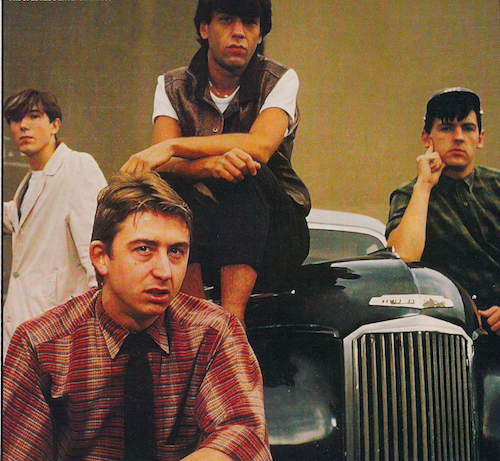
It seems that Talk Talk are a matey, chatty bunch of chaps. The band, who this week release a re-recorded version of their second and eponymous single ‘Talk Talk’ have recently been providing a public services for lonely and distressed Canadian customs men.
“Yeah, we got stopped in Canada” vocalist Mark Hollis tells me. “We spent about half the night thing to get over the border. There was this bloke who was in charge of customs on the Canadian border who wouldn’t let us pass. We went through at night-time and I think he was a bit lonely, so he stopped us for a couple of hours and when some more people came along, he mysteriously found the document we needed to get through. Originally he said he didn’t have it, but he let us through anyway and kept the other people talking.”
This touching incident of night-time camaraderie took place on the band’s North American tour, where they supported one Elvis Costello, and also headlined some small club dates themselves.
Mark explains the American music scene to your extremely parochial Londoner: “There’s a funny set-up in American with all the radio stations. Because they’re all commercially orientated they’re always playing music that will attract sponsorship. A large proportion of their audience want to buy cars and washing machines, so they’re playing records for people in their thirties…people with a bit of money. The whole music scene stopped in 1974, it’s all Lynyrd Skynyrd and Led Zeppelin. There are a few stations, like K-Rock that adopt a programme much like the Kid Jensen show. They’re aimed at a younger audience and are starting to influence other stations. The sort of stuff being played is Soft Cell, Human League, Flock of Seagulls and us”.
Despite the conversation of US radio, new British pop has benefitted by an interesting recent development. “They’ve got this thing called music television, which is like a cable TV channel that goes out all over the country. It only shows videos and the majority of the videos are of English bands. Once they select what they’re gonna play it goes into a heavy rotation, and our video is right in there. Even in areas where we received no radio play, there were people who knew us from the video”
Talk Talk’s blitz of the States seems to have met with some success, their current single there being posed to hit the Top 40. Yet why did they choose to tour with Costello, a rather strange bedfellow in my opinion?
Mark, articulate as ever, has a plausible answer at the ready: “there were two main reasons. Firstly there was as section of his audience who would have seen him when he first went over and was considered New Wave. We thought that meant they’d be people who’d be prepared to listen to new forms of music. Secondly he’s so obviously a songwriter, he would attract a LISTENING audience, who’d be prepared to give us a chance”.
And did they? “Yeah, there’s a whole different attitude over there. You’re looked upon as an opening act, not a support act”.
Paul amplifies: “They’d never seen a group without a guitarist, we were totally new to them.
Though one appreciates the perils of a young English pop band amongst the heathen colonials, why have the band chosen to consolidate the success of their ‘Today’ single with a re-release? Whilst acknowledging the commercial sense of such a move - Talk Talk is an irresistibly catchy number - I wonder whether the Essex boys are short of a song or two.
“We feel it should have been a hit the first time out but it wasn’t. We haven’t done it as a straight re-issue, as we’ve re-recorded it and re-produced it. We went into the studio with someone who’s possibly gonna produce our next LP (Rhett Davies). So it also gave us a chance to see how we’d work with him”. Mark explains the thinking behind the first LP and the slight change of direction that is to come. “On the first LP we were making the point of trying to combine two sounds. There was the American sound for clarity and the English sound for force, that’s why were used Thurston to record the songs clearly and Robinson to give it a bit more edge. With the new one we went to get someone who can naturally combine those two aspects. We’re going to take the emphasis slightly away from the synthesiser. With our first LP it was a totally minimal thing, the number of overdubs and everything was very small:.
Mark Hollis is very earnest about his music. Though his band have often been written off as shallow and plastic, there is a seriousness and honestly about Talk Talk’s approach that will help them to outlast their more lauded rivals. Simply, Talk Talk put their music first and worry about the trimmings later. Mark stands in contrast to the other, younger, members of the band, having a more restrained, reflective attitude to life. Compared to this, the lifestyles of the bassist Paul Webb and drummer Lee are near frenetic. Yet Mark explains that Talk Talk’s strength derives from this apparent opposition. “There’s a diversity in this band which is really healthy. Paul and Lee are more likely to listen to things which are heavily rhythmic and dance orientated, partly ‘cops they like night-clubbing. Simon and I listen to things that are articulately arranged, music with an emphasis on melody. When you bring the two approaches together the result is very strong”.
The eminently likeably Paul Webb is the groups prime night clubber. The Southend Lothario fill me in on his favourite club. “The Roxy in New York is fantastic. I used to treat rap music as very lightweight, but when you go to a place like that at four in the morning and you’ve got little nine year old kids looking like they could dance for ever - it’s really great”.
Lee Harris has aged an eternity, a babyfaced young boy when I first met him a bare 16 months ago, he seems to have grown up overnight. “I wasn’t even shaving then, now I am. I started about seven months ago. I do the proper old fashioned wet shave”.
Talk Talk are beginning to feel the work load - and pressure - of success, of expectancy. Yet they’re not silly. “We’re really careful that touring and other commitments still allow us time to write. We don’t want to be put in a position where we’ve got three weeks to write an album”.
Talk Talk start their first major UK tour next week. It’ll be a traditional affair. Traditional? A funny word for a bright, clean, young pop band? Well not really, ‘cos Talk Talk have the ever enduring qualities of musicianship, application and imagination that set them apart from their glossier competitors. Can you spot the difference yet?
^ go back to topSounds: 27th November 1982
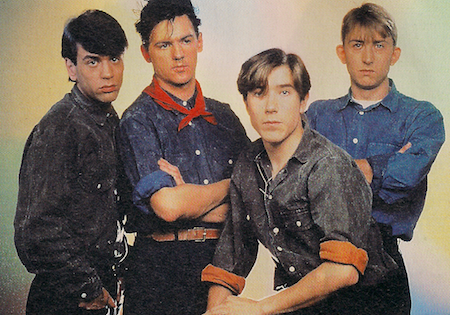
It’s not enough simply to perform at a cavernous venue like the Dominion. You have to physically entertain too. Absorb! Interest! Transfix! Illuminate! And let’s face it, Talk Talk aren’t that special. They don’t have the inanimate beauty of a Sylvian to draw on; or the ridiculous style of a Spandau or a Rondo. They lacked any ort of presence.
The medium proved just too much for them and there was no advantage in leaving the more versatile confines of the video. Talk Talk are wasted live. I admit that in a closer setting, things may have been different, but in the impersonal sterility of a West End cinema Talk Talk definitely needed that certain something. Star quality? Visual appeal? Something. It’s a shame because I admit I was pleasantly surprised by the diversity and variety of their music.
Talk Talk performed with ease and at least vitality, proving it’s not professionalism they’re in need of. Slower numbers were interspersed at appropriate moments and the lead vocal carried off the faster songs with a quite stylish, strained simplicity. But it wasn’t good enough. There was nothing to stop me from sliding into my seat an gazing at the rafters.
And sorry, but sickly green light and dry ice didn’t save the day either; that does not constitute Visuals. This kind on non-minimalist dance music can’t get away with such a pauperised setting.
Support band Music for Pleasure also fell foul of the echoing stage. Though valiant in struggling through a chattering crowed just drifting in from the drenched London streets, they stood rooted to the spot in a harsh white light like rabbits in car headlights. And unlike Talk Talk they had no chart hype or teenage adulation to tempt the disinterested (though polite) audience away from buying Talk Talk t-shirts in the foyer. Plus their music lacked finesse, variety and style.
Talk Talk need to find that extra dimension. They have to adapt to a large stage if they’re going to attempt this kind of venue. Otherwise, like tonight, it’s all so extraordinarily dull.
(Carole Linfield)
^ go back to topRecord Mirror: 4th December 1982
First of all what Talk Talk are not; they are not another wet pretty boy synth band, they do not ply their trade on studio ‘treatment’ or the frantic overwork of aspiring fashion designers. What they do is simply mix the power and drive of ‘rock’ music with the deft application of modern methods and good old-fashioned musicianship.
Talk Talk at the Dominion was a surprisingly powerful thing, at times a little pompous, on occasions a mite stylised but difficult to ignore. They have good songs, they play them well. What more could they offer? Well perhaps a little more glitter, a touch more personality. And yet the sight of Mark Hollis, a latter-day Lee Brilleaux fronting a modern pop band, is so wonderfully incongruous that such criticisms seem mere trifles.
(Jim Reid)
^ go back to topNoise! 9th December 1982
(Kevin Murphy)
^ go back to topSmash Hits: 9th December 1982
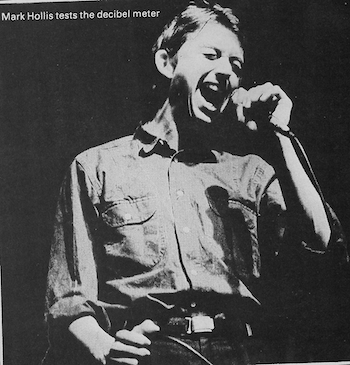
Talk Talk appear through the thick smoke and lights to thunderous applause. Surprisingly for a band who have only had one hit single and a moderately successful album.
These effects work well in the early stages of the set. They match the Japan-styled mood which is created by a saw-edged synthesizers, climbing bass and drum rhythms, plus Mark Hollis’s powerful voice which sends mild shivers up my spine.
However, they also cover up a somewhat limited stage presence that becomes more obvious as the show progresses. The effects before more grandiose, culminating in a needlessly bombastic climax of sound, smoke and light in the penultimate song, ‘The Party's Over’. But is all this really necessary?
(Peter Stockton)
^ go back to top